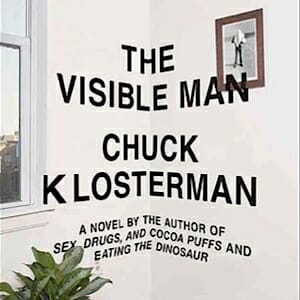The Visible Man by Chuck Klosterman
The Rise of Reality Fiction

“In the end, technology, unto the world will set us free.”—Dick Valentine
Ask the casual observer, “What is Chuck Klosterman’s main subject?” He’ll answer, “Pop Culture.” It’s hard to look Klosterman up on Google or Amazon without seeing the phrase “pop culture junkie” in various iterations.
Understandable. Pop culture, however, is not the fundamental drive-shaft of the Klosterman engine. It may be the rims, the grill, the spoiler, the hydraulics, and sometimes even the steering wheel. But pop culture itself does not propel the Klostermobile, even when it fuels it.
What truly drives Klosterman’s metaphorical automotive is nihilism. By that, I don’t mean the very popular misunderstanding of nihilism: cynical atheism, mistrust of authority, and moral bankruptcy. I mean instead a literal lack of intrinsic beliefs: nothing taken for granted, a breakdown of prejudice, the removal of assumptions. Pop culture just happens to be one of those areas where we make lots of presumptions and share more experiences than maybe anywhere else.
[Readers may object here, thinking “But lots of Klosterman essays are riddled with personal assumptions, some of which seem hastily thought out!” Correct. These are either a) abstractions made for the purpose of illuminating a bigger picture, or b) hiccups where the Klostermobile stalls out. But I digress.]
Klosterman’s second novel, The Visible Man, presents a smarmy genius who has invented an invisibility suit for the purpose of studying modern man up close and at his most mundane. The protagonist’s exploits unfold in transcripts of discussions with his therapist, whose notes preserve anonymity by referring to him simply as “Y__”.
We find that Y__ has literally sat in individuals’ homes, watching them do nothing in particular, for extended periods of time. He does this for anthropological purposes that he himself doesn’t entirely comprehend, but that seem scientifically important because people never behave completely naturally when they know they’re being watched. These studies cause Y__ to experience feelings of guilt for “consuming the reality” of other people‘s lives, even though he doesn’t think it’s actually “wrong.”
Y__’s recounts of voyeurism oddly compel, exploring as only fiction can do territory more familiar in the should-be thrills of reality television. Klosterman blends predictability, asininity, and enough smatterings of The Beatles, the Internet, and sports to render his voyees as vivid, lifelike dullards. The author includes the clunky details of an invisibility suit; he manages to geek-out on the logistics of invisibility-spying just enough to put this book on the cusp of psychological sci-fi. If you’re a casual fiction reader, you’ll race through the middle portion of the narrative, attempting to mainline the voyeur sequences. You’ll switch allegiances a few times to and from the dubious, prickly quasi-hero. And you will ultimately find a disappointing lack of resolution at the point where art and entertainment diverge.
Readers more interested in Klosterman as a pop-cultural phenomenon in his own right will find that The Visible Man—a title meant to remind us that people’s purest unaffected selves become truly visible only in moments of routine isolation—reveals just as much about Klosterman’s view of himself as his view of others.
The Visible Man seems to appoint “mission statement” status to one of Klosterman’s essays in his 2009 book Eating The Dinosaur. The piece, “Through a Glass, Blindly,” very well could have been titled, “The Importance of Voyeurism.” To Klosterman, observing those who believe they are unobserved is the only way to intentionally experience the visceral sensation of profound suspense. We can’t get such suspense from fiction, with scripted narratives that that guide our understanding of events likely to occur … and real suspense is especially unavailable from reality TV.
Klosterman writes that the physio-psychological stress of observing the complete unknown—like watching a fight break out or a car accident—fires our neurons primally and brings us closer to what he calls “the original state of being.” He finds an example in the stressful, confusing, manic life of a wolf.
-

-

-

-

-

-

-

-

-

-

-

-

-

-

-

-

-

-

-

-

-

-

-

-

-

-

-

-

-

-

-

-

-

-

-

-

-

-

-

-








































